The portrait of Korean families stained with domestic abuse
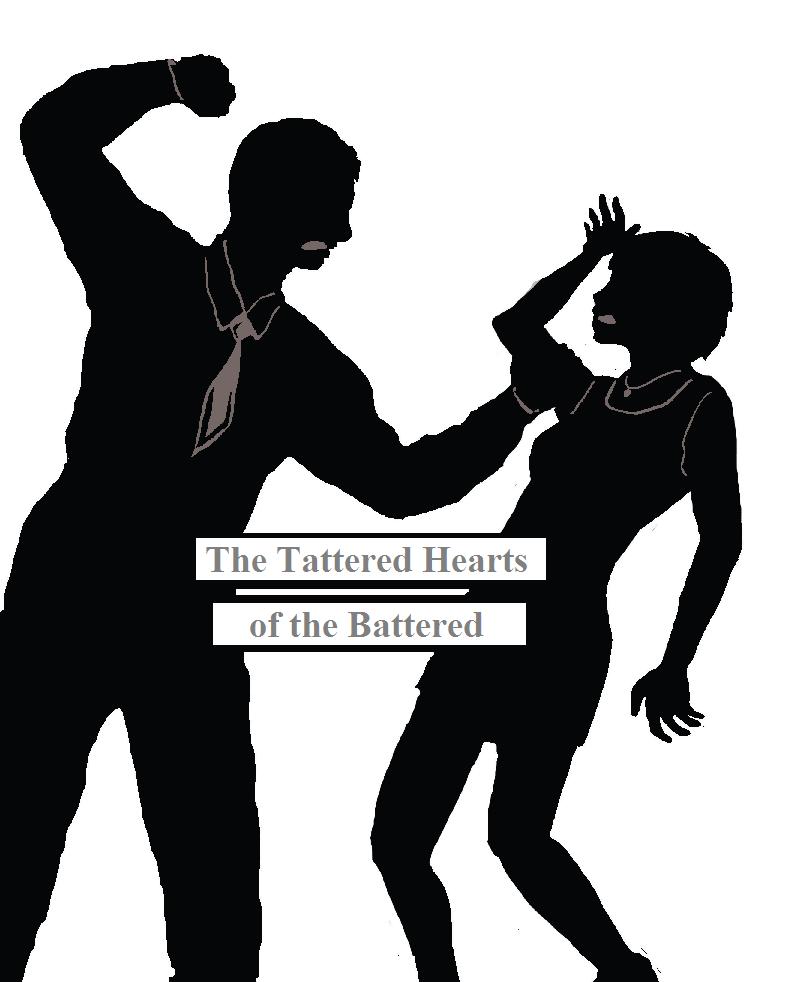
In Korean society, domestic violence was considered a family issue that was not to be discussed in public. Such mindset caused several problems concerning the issue. Often, subtle forms of abuse are justified despite the fact that they can lead to serious consequences. What is worse, many people only conceive men as the assailant and women as the victim, which is the usual case. However, one should note that men are victimized more often than we think, and that fear and shame have caused suppressed silence. It being the month of family, The Yonsei Annals seeks to disengage such prejudices and address the current situation.
- Ha Jung-yun, Editor of World Affairs Div.
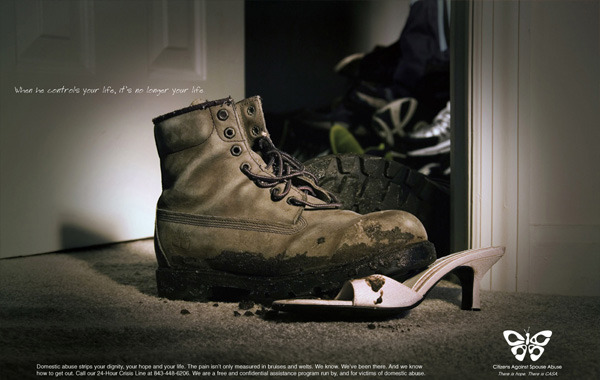
I Got Flowers Today.
I got flowers today.
It wasn't my birthday
or any special day.
We had our first argument last night,
and he said a lot of cruel things
that really hurt me.
I know he is sorry
and didn't mean the things he said
because he sent me flowers today.
I got flowers today.
It wasn't our anniversary
or any other special day.
Last night, he threw me into a wall
and started to choke me.
It seemed like a nightmare.
I couldn't believe it was real.
I know he must be sorry
because he sent me flowers today.
I got flowers today,
and it wasn't Mother's Day
or any other special day.
Last night, he beat me up again.
If I leave him, what will I do?
How will I take care of my kids?
What about money?
I'm afraid of him and scared to leave.
But I know he must be sorry
because he sent me flowers today.
I got flowers today.
Today was a very special day.
It was the day of my funeral.
Last night, he finally killed me.
If only I had gathered
enough courage and strength
to leave him,
I would not have gotten flowers today.
- by Paulette Kelly
Domestic abuse -- against wives
It is a crime that takes place behind locked doors, violence between two people who vowed to love each other in sickness and in health. Domestic abuse has long been rooted as the dark side of society, and this ongoing problem is still being ignored today. Furthermore, when it comes to domestic violence, women are more prone to be the victim. According to research by Korea Institute for Health and Social Affairs (KIHSA), 33.1% of wives suffered from domestic abuse from their husbands in 2007. Within 33.1%, 26.4% of the abuse was mental abuse1), and 9.4% was physical abuse2). Moreover, according to a Korea Women's Hotline (KWH), 46 wives were killed by their husbands in 2009 alone.
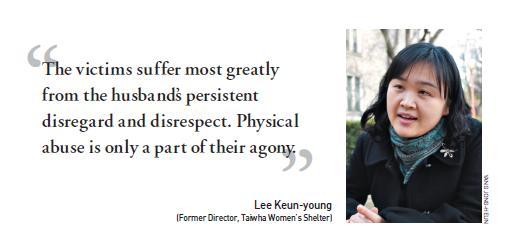
Nevertheless, the most hidden and serious are the victims who cannot even call for help. "Actually, the wives who are severely assaulted do not even consider calling the police or calling for help because they are too suppressed by their husbands," lamented Kim Hong-chan. The severe domestic violence cases where women truly need help are hidden behind closed doors.
Oftentimes, the mental abuse from the husbands is more severe than the physical abuse. "I feel that the victims suffer most greatly from the husband's persistent disregard and disrespect. Physical abuse is only a part of their agony. It is the behavior, slandering words that continue for their lifetime that causes the torment," explains Lee Keun-young (Former Director, Taiwha Women's Shelter). However, most wives do not take actions for such psychological abuse because many do not recognize that psychological damage is a form of abuse. "Most of the mental abuse victims tend not to seek help because there is no clear evidence to prove the psychological violence. Most women believe that domestic abuse is an intimate family issue or secret, which makes matters worse. In addition, many families in Korea are unfamiliar with couple counseling. However, without counseling and reaching out for help, there is no way to cure the abuse," says Kim Jae-yop (Prof., Dept. of Social Welfare).
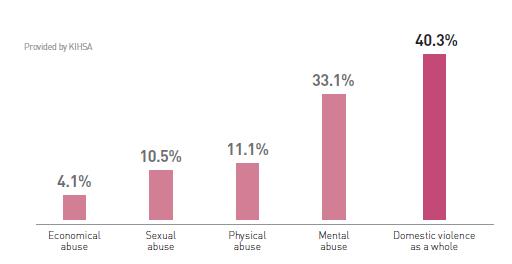
A better life for wives - the solution
With such lack of support for wives suffering from violence, they cannot help but be disheartened inside as well as outside the home. Therefore, there needs to be improvements to help secure better lives for abused women.
Firstly, practical procedures to prevent further violence should be sought after. In France, electronic bracelets have to be worn by men who have received a court order to stay away from their partners. If they break the order and make an approach, the police are alerted. Furthermore, the parliament of France is also considering outlawing psychological violence at home, because it is seen as a precursor to physical violence. With pragmatic measures such as electronic bracelets, further domestic violence can be prevented.
Secondly, the shelters abused women are staying at should prepare programs that help women earn a living in order to support themselves when they go back out in society. In a survey by KWH, 43 out of 71 women who have been protected in the shelters pointed out the need for help to find a job. However, such wants are hard to fulfill in reality. Lee explains the reason why, "Right now, women can only stay in shelters for a short time. Therefore the focus is mostly on providing comfort. In order to provide such educational programs, there must first be more shelters that allow women to stay for a longer period of time," Instead of leaving women with no choice but to return to the potential violence again, aiding them to stand stronger in society is necessary.
Thirdly, there should be more educational programs nationwide to raise the awareness of domestic violence. Right now, there are practically no opportunities for younger generations to learn about the negative effects of domestic abuse. "To end society's negligence of domestic violence, public broadcasting should promote awareness on domestic abuse," says Kim Jae-yop.
Fourthly, for the mental abuse problems, individual efforts as well as the efforts of those around the victims are needed. "The victims who are being assaulted should actively seek counseling. Enduring the violence will not solve the problem. Moreover, the people who are close to the victims should let them know that mental abuse is also a serious part of domestic violence, and encourage them to seek help," explains Kim Hong-chan.
Above all, however, there most fundamentally needs to be a change in perception. "The abuse on wives cannot be rooted out while sexual discrimination in the roles of women and family structure still exist in society. Without perceptional change, any legal change would only be superficial," says Jeong Chun-sook (President, Korea Women? Hotline).
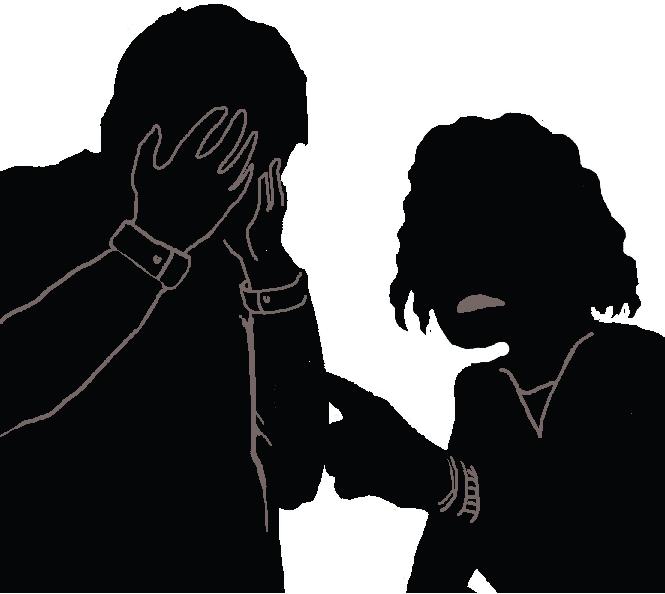
Confessions of a battered man
Ever since I lost my job, I have lost my place within the family. The mental and physical abuse from my wife has become unbearable. Any trivial mistake I make inside the house like dropping a cup or talking back to my wife would make her rave with anger. She constantly belittles me even in front of the children, so now they refuse to even talk to me, making me feel invisible inside the house. One day, I could not bear to stay in the house, so I went out to avoid conflicts, and came home at a late hour. I knocked on the door, but she would not let me in. That night, I had to sleep outside. Moreover, as time went on, her violence became more vigorous. She would resort to physical abuse; she would constantly scratch my face, leaving several scars. I could not go outside because of embarrassment until the scars healed. Once, she broke into a fit of rage, she picked up a bowl and smashed it against my leg. It required several stitches. The real injustice occurred when I tried to protect myself by grabbing her arm and pushing her; she called the police, accusing me of assaulting her. The police believed her -- it seemed as if they could not even think of man being a victim. As a man, it is so embarrassing to be abused by a woman, so I cannot tell my worries to anyone. Although I am depressed by the abuse, I withstand her violence because I want to keep my family together.
* This story is based on a true case that was dealt with by a counselor.
Domestic abuse - against husbands
Although majority of the domestic abuse victims are usually women, more and more men live in fear inside their homes; and these cases lie hidden underneath. According to the parliamentary inspection of the National Police in 2008, 353 cases were reported as wives being perpetrators of domestic violence. Moreover, according to Korea Men's Hotline (KMH), it received 3,692 calls from men calling for counseling in 2008 alone; 30% of the husbands suffered from physical abuse and 70% from psychological.
In reality, however, the actual number of men suffering from violence would be much higher because abused men are reluctant to report their situations. "Men suffering from domestic abuse consider it embarrassing to inform their situation to police or anyone around them. Therefore in many cases, they just endure the abuse," explains Lee Ok-lee (Chief Manager, KMH).
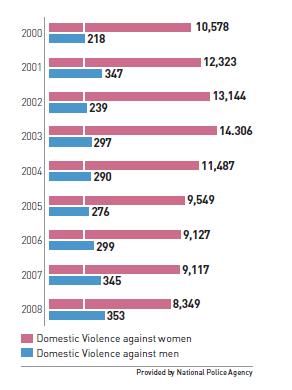
Again, the greatest hindrance in resolving domestic violence against battered husband is the perception of society, the stereotype of men expected as the head of the household. "When men suffer abuse from their wives, they really have nowhere to confess their problems. Whereas battered women can confide in family members and friends more easily, battered men have more difficulty admitting being abused. It is almost like a 'taboo word' in a male-dominated society like Korea," says Lee. Consequently, beaten men have no choice but to keep their scars and problems to themselves. Lee further explains their inflictions. "Although women can maintain their position within a family without many problems when she loses the ability to earn money, men who cease to earn a living cannot maintain their status in the family, often leaving them alienated."
A better life for husbands - the solution
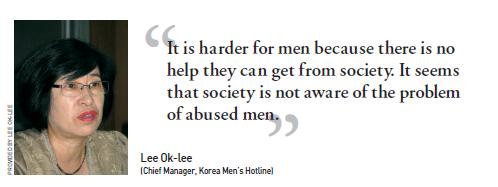
In order to help those husbands who are suffering from domestic abuse, society needs to change its perception of men. "Many men who are being ignored inside the family are the ones who have lost their ability to earn an income; however, such perception of men as the breadwinner needs to be changed. In that way, even after men retire, they can safely find their way back inside the family," explains Kim Hong-chan.
Secondly, protection should be provided for them. Being aware of the rising number of abused men, foreign countries have established shelters for men. England has maintained shelters for men since 2003 and Switzerland recently opened two shelters for battered men. Accordingly, Korea needs to protect more than 350 men who suffer, by providing at least few shelters where men can find peace.
Thirdly, it is important that the fathers constantly make efforts to integrate with the family members. "The fathers in their middle ages find it hard to be intimate with family members. Yet, without communicating and spending time with the family, they are bringing such neglect upon themselves. With a little more attention to their wives and children, no family would try to abandon their father," says Lee.
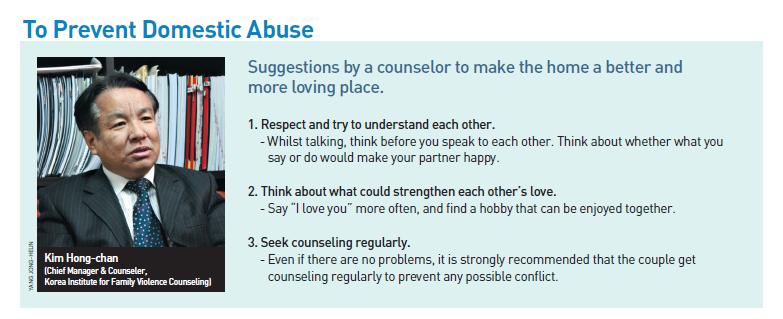
* * *
They loved, so much that they decided to spend the rest of their lives together. However, when faced with the wall of reality, the vow had to be shattered. The once passionate love turned into intense antagonism, as respect for each other withered away. The homes that should be a haven turned into a battlefield, wounding the hearts of husbands and wives. However, as prevention is the best cure, with efforts to understand and respect one another, domestic abuse can be averted. This month, which is the month for family, I hope the love at home burgeons like the blooming blossoms in May.

